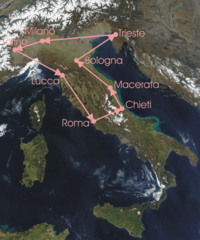1920 Giro d'Italia
 | |||
| Race Route | |||
| Race details | |||
|---|---|---|---|
| Dates | 23 May – 6 June | ||
| Stages | 8 | ||
| Distance | 2,632 km (1,635 mi) | ||
| Winning time | 102h 44' 33" | ||
| Results | |||
| Winner | (Bianchi) | ||
| Second | (Bianchi) | ||
| Third | (Bianchi) | ||
| Team | Bianchi | ||
The 1920 Giro d'Italia was the 8th edition of the Giro d'Italia, a cycling race organized and sponsored by the newspaper La Gazzetta dello Sport. The race began on 23 May in Milan with a stage that stretched 348 km (216 mi) to Turin, finishing back in Milan on 6 June after a 421 km (262 mi) stage and a total distance covered of 2,632 km (1,635 mi). The race was won by the Italian rider Gaetano Belloni of the Bianchi team. Second and third respectively were Italian Angelo Gremo and Frenchman Jean Alavoine.
Of the 49 riders who started the race only 10 crossed the finish line in Milan.
Participants
Of the 49 riders that began the Giro d'Italia on 23 May, ten of them made it to the finish in Milan on 6 June.[1] Riders were allowed to ride on their own or as a member of a team. There were three teams that competed in the race: Bianchi-Pirelli, Legnano-Pirelli, and Stucchi-Pirelli .[1]
The peloton was almost completely composed of Italians.[1] The field featured two former Giro d'Italia champions in the three-time winner Carlo Galetti and returning champion Costante Girardengo.[1] Other notable Italian riders that started the race included Angelo Gremo, Giovanni Gerbi, and Giovanni Rossignoli.[1] Frenchman Jean Alavoine who had some high placings in the Tour de France, along with the successful Belgian cyclist Marcel Buysse started the race.[1]
Final standings
Stage results
| Stage | Date | Course | Distance | Type[Notes 1] | Winner | Race Leader | |
|---|---|---|---|---|---|---|---|
| 1 | 23 May | Milan to Turin | 348 km (216 mi) | |
Stage with mountain(s) | |
|
| 2 | 25 May | Turin to Lucca | 378 km (235 mi) | |
Stage with mountain(s) | |
|
| 3 | 27 May | Lucca to Rome | 386 km (240 mi) | |
Stage with mountain(s) | |
|
| 4 | 29 May | Rome to Chieti | 234 km (145 mi) | |
Stage with mountain(s) | |
|
| 5 | 31 May | Chieti to Macerata | 236 km (147 mi) | |
Stage with mountain(s) | |
|
| 6 | 2 June | Macerata to Bologna | 282 km (175 mi) | |
Plain stage | |
|
| 7 | 4 June | Bologna to Trieste | 349 km (217 mi) | |
Plain stage | |
|
| 8 | 6 June | Trieste to Milan | 421 km (262 mi) | |
Plain stage | See below | |
| Total | 2,632 km (1,635 mi) | ||||||
In stage 8, the sprint was disrupted when a horse got on the track, and all nine cyclists in the first group were declared winner. These nine cyclists were, in alphabetical order:[1]
- Ugo Agostoni
- Jean Alavoine
- Gaetano Belloni
- Marcel Buysse
- Nicola Di Biase
- Angelo Gremo
- Emilio Petiva
- Giovanni Rossignoli
- Enrico Sala
General classification
There were ten cyclists who had completed all ten stages. For these cyclists, the times they had needed in each stage was added up for the general classification. The cyclist with the least accumulated time was the winner.
| Rank | Name | Team | Time |
|---|---|---|---|
| 1 | |
Bianchi | 102h 44' 33" |
| 2 | |
Bianchi | + 32' 24" |
| 3 | |
Bianchi | + 1h 01' 14" |
| 4 | |
— | + 3h 02' 44" |
| 5 | |
— | + 3h 36' 20" |
| 6 | |
Bianchi | + 3h 52' 49" |
| 7 | |
Bianchi | + 4h 17' 35" |
| 8 | |
— | + 4h 43' 28" |
| 9 | |
— | + 5h 54' 47" |
| 10 | |
— | + 6h 03' 16" |
Notes
- ↑ In 1920, there was no distinction in the rules between plain stages and mountain stages; the icons shown here indicate that the first, second, third, fourth, and fifth stages included major mountains.
References
- 1 2 3 4 5 6 7 8 9 Bill and Carol McGann. "1920 Giro d'Italia". Bike Race Info. Dog Ear Publishing. Retrieved 2012-07-10.